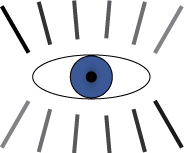 Facebook has a bold strategy that mashes up the social graph with the Web—in the service of using digital transactions to develop in-depth understanding of people. This has far-reaching implications for what “public information” about you and your friends may soon look like. It will likely redefine the concept of privacy, so it is definitely a development to watch.
Facebook has a bold strategy that mashes up the social graph with the Web—in the service of using digital transactions to develop in-depth understanding of people. This has far-reaching implications for what “public information” about you and your friends may soon look like. It will likely redefine the concept of privacy, so it is definitely a development to watch.
Before I dive into that, however, hats off to the GigaOM team, who have been doing some excellent reporting on Facebook’s “opening up” to the Web. Check them out.
As I understand it, Facebook’s strategy is transitioning to a new phase. The process may look like this:
- Phase One: Create social graph by mapping people to each other, within Facebook. Establish social context and actions. Example actions: posting messages on a Friend’s Wall, tagging people in photos.
- Phase Two: Extend Profiles by mapping people to their transactions, all over the Web. This would give Facebook a unique understanding of users’ identity based on what they do, what they say, whom they’re friends with, how they act. Through actions and metainformation, Facebook will build an engine for understanding people, via a very scalable process (IOW, users report on each other at no cost to Facebook).
Information is Stupid, People Are Smart
Our brains qualify the social nuances of information very well. We create human meaning around it, or human metainformation, which makes information relevant and useful. Machines are hopeless at this, so if we want metainformation, we have to do it ourselves. Humans have always underestimated how difficult this is. Recently I gained a much deeper appreciation through Robin Dunbar’s Grooming, Gossip, and the Evolution of Language. You can’t pay people enough to create metainformation because it is tedious work. However, Facebook has conditioned people to do it for free by enabling users to create social metainformation about each other for their own use. But, of course, Facebook can also use that information.
How Facebook Can Create a Rare Storehouse of Insight about People
I initially became interested in this concept during Web 1.0 when I was thinking about Amazon’s collaborative filtering technology. If people buy Cecilia Bartoli’s Mozart arias with Vivaldi trumpet concerti, Amazon will suggest the Vivaldi to people buying Mozart and vice versa. This is rudimentary metainformation based on transactions. The thing to notice is it is digitally produced at no cost to Amazon beyond the servers and the programming, which are negligible.
The other thing that makes sense to me is the larger the disparities between transactions Amazon can corelate, the more insight. There is little disparity between Vivaldi and Mozart. But let’s say Amazon can corelate Vivaldi and Gore Vidal and Porsche pens. More insight due to larger variety of items and data points.
Facebook has a similar system except they are crowdsourcing a huge database of social information that’s being created by humans. They arguably have the largest digital social graph database in the world, and it’s growing quickly. They want to use this social graph as a lens to look out into the Web overall to gather a larger variety of information, which is related back to Profiles. Unparalleled marketing insight.
More Facebook 2.0
Here’s an example of how it works. Facebook’s imminent Open Graph API enables users to “fan” any page on the Web, without the company’s permission. Open Graph will turn any page into a “Facebook Page” so that it can have Facebook Page functionality (collect Fans, etc.). As GigaOM’s Liz Gannes writes:
Facebook has trained 350 million users to publicly post personal endorsements. IOW, it has an army of volunteers ready to organize the Web on its behalf.
Facebook intends to leverage its social graph advantage to the hilt. Where Google creates connections and returns the Web via searches, Facebook proposes to leverage the social graph, betting that people will care more about what their friends think that what the whole Web thinks.
Gannes calls Facebook’s proposition, “the wisdom of friends” where Google’s is “the wisdom of crowds.”
Read The Dawn of Facebook’s People-organized Web
What do you think?

Leave a Reply
You must be logged in to post a comment.